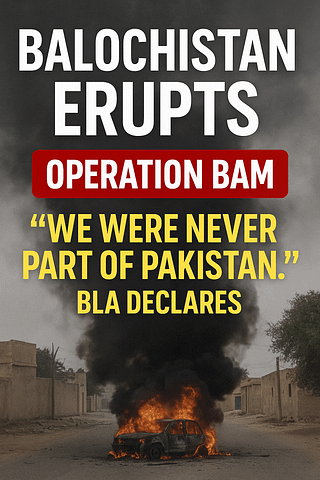
Bharat Global Time News Desk
Date: July 15, 2025
In a major escalation of separatist unrest, Balochistan has once again turned into a battlefield, with the Baloch Liberation Army (BLA) launching a daring offensive codenamed “Operation BAM” against multiple Pakistan Army installations. Explosions, gunfire, and black smoke filled the skies over key areas in Turbat, Panjgur, and Gwadar, leaving the Pakistan military stunned.
In a bold and defiant statement, the BLA has declared:
“We were never part of Pakistan. We are reclaiming what was forcefully occupied in 1948.”
This marks one of the most coordinated and symbolic attacks by the Baloch separatists in recent years — and signals a growing push for full independence.
What is Operation BAM?
Operation BAM (short for Baloch Armed Movement) is a series of coordinated strikes launched over the past 48 hours targeting:
- Pakistan Army checkpoints and outposts in Makran region
- Military convoys moving along the CPEC route (China–Pakistan Economic Corridor)
- A communications tower near Gwadar Port, temporarily disrupting military logistics
The BLA claims the attacks were conducted by highly trained guerrilla units, and several Pakistan Army soldiers have reportedly been killed or injured — though official numbers are still unclear due to media blackouts.
BLA’s Declaration: “Balochistan is Not Pakistan”
In a viral video statement, the BLA’s spokesperson stated:
“The Pakistani state has no legitimacy in Balochistan. The world must recognize this war of liberation. Our land was never legally acceded. This is an occupied territory.”
This open declaration is not new, but the timing, boldness, and scale of Operation BAM suggests that the Baloch separatist movement is entering a new phase of direct confrontation.
Pakistan’s Official Response
The Pakistan Army’s media wing, ISPR, confirmed that “terrorist elements launched cowardly attacks” in the Makran belt, but claimed the situation is “under full control.” Internet access has been heavily restricted in the affected regions.
Analysts note that:
- Pakistan may intensify crackdowns across Balochistan
- Further militarization around Gwadar and Quetta is expected
- Media blackout and arrests of suspected Baloch sympathizers are already underway
However, there is growing concern within Pakistan that China may be alarmed, given its multi-billion-dollar investments in CPEC, especially through the Gwadar Port, now under threat.
Why It Matters Globally
- China’s Strategic Risk: Baloch insurgents have already targeted Chinese engineers and CPEC projects. These new attacks could delay or derail Chinese investment, something Pakistan cannot afford right now.
- Human Rights Spotlight: With renewed violence, international human rights groups may begin increasing pressure on Islamabad over alleged military abuses in Balochistan.
- Regional Instability: Pakistan’s internal instability could spill over into neighboring Iran and Afghanistan, both of which have their own Baloch populations and separatist concerns.
- India’s Watchful Eye: New Delhi has long accused Pakistan of sponsoring terror in Kashmir while ignoring unrest in its own provinces. This flare-up gives India a geopolitical advantage on the global narrative front.
Historical Background: The Balochistan Question
- Balochistan was a princely state that had declared independence on August 11, 1947, just days before Pakistan’s formation.
- On March 27, 1948, Pakistan forcibly annexed Balochistan.
- Since then, five major uprisings have occurred — the current being the longest and most violent, ongoing since early 2000s.
Despite Pakistan’s claims of development, the Baloch population has complained of:
- Resource exploitation (natural gas, minerals, coastline)
- Military oppression and disappearances
- Neglect in education, jobs, and infrastructure
What Comes Next?
- The BLA promises more coordinated attacks, potentially targeting CPEC convoys and Chinese assets.
- Pakistan may launch massive counter-operations, further deepening the cycle of violence.
- Calls for international mediation or monitoring missions may rise.
Conclusion: A Rebellion Rekindled
Balochistan is erupting again, not just with guns and explosions, but with a fierce cry for identity, sovereignty, and freedom. With Operation BAM, the BLA has sent a strong message: The fight is far from over.
Whether Pakistan crushes this movement or the world begins to take Baloch aspirations seriously — the conflict is now impossible to ignore.
For real-time updates on Balochistan, Indo-Pak dynamics, and global affairs, follow Bharat Global Time.





